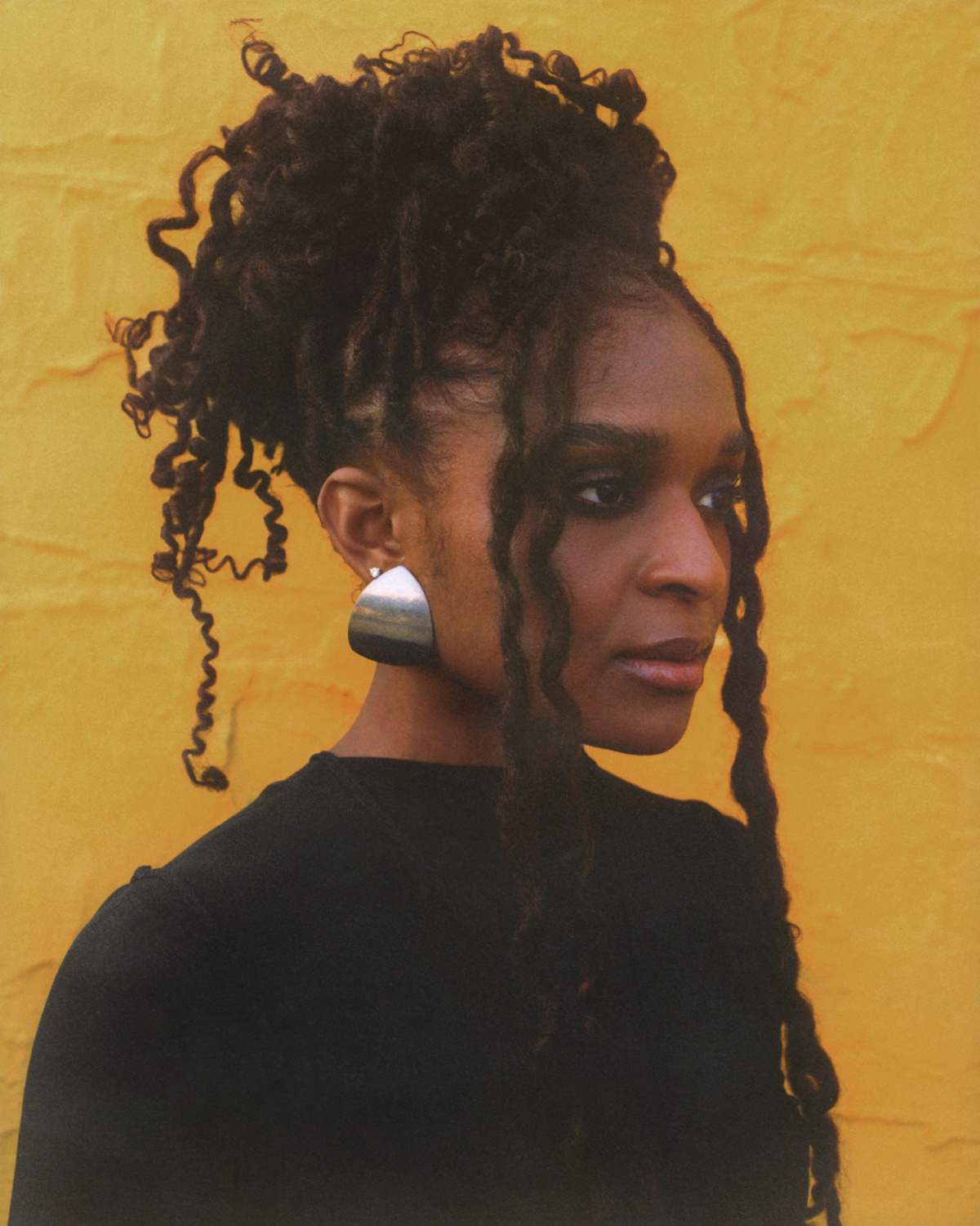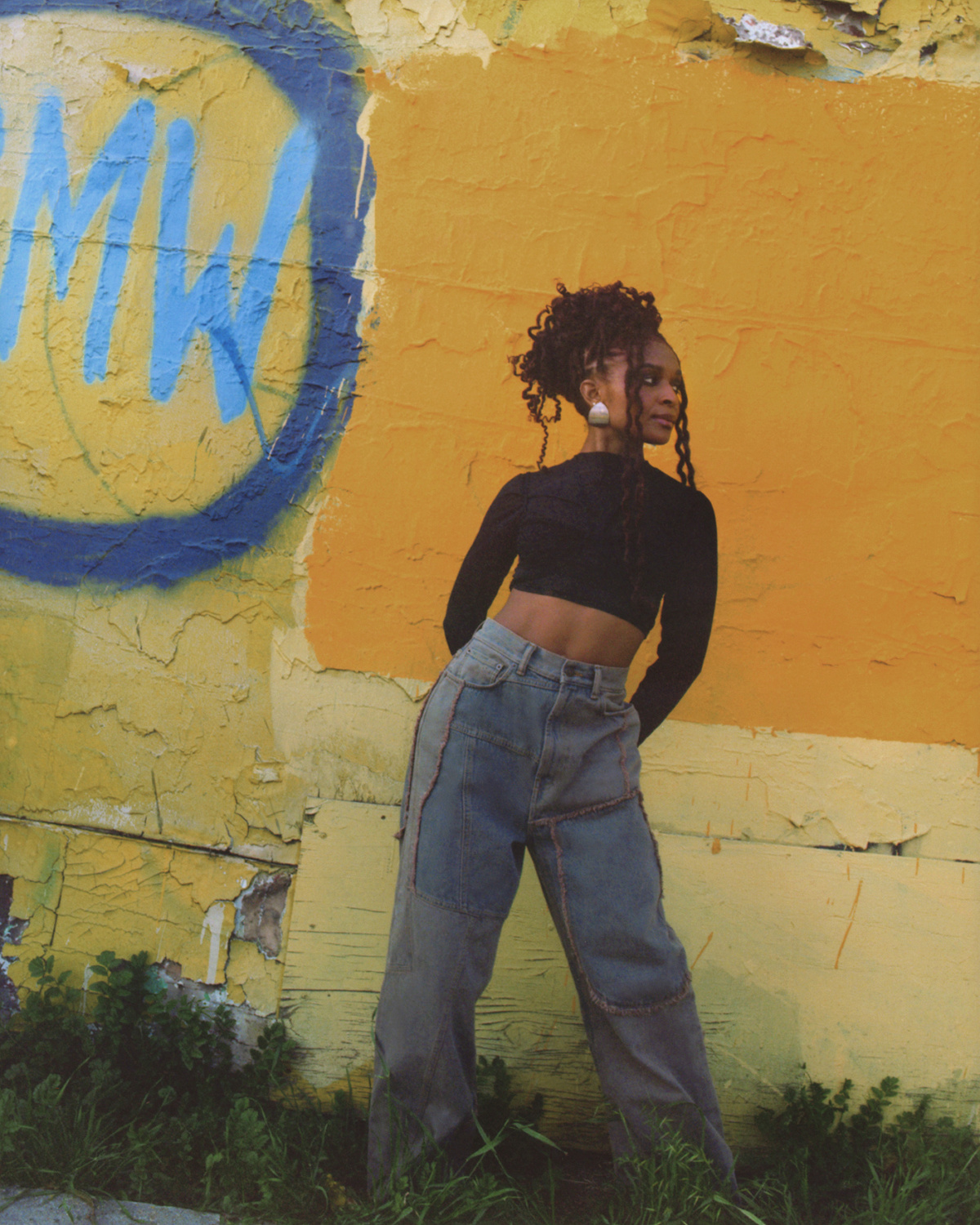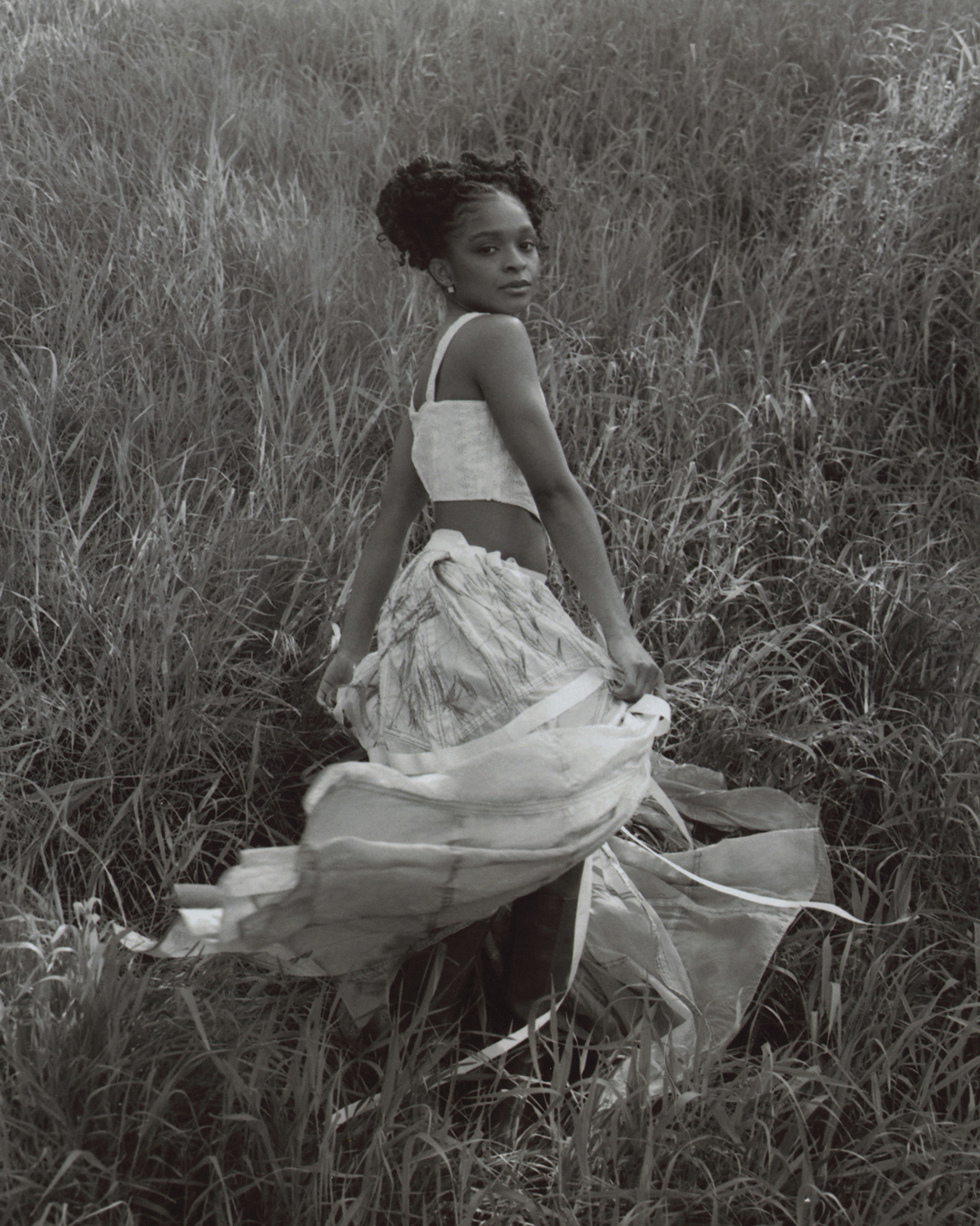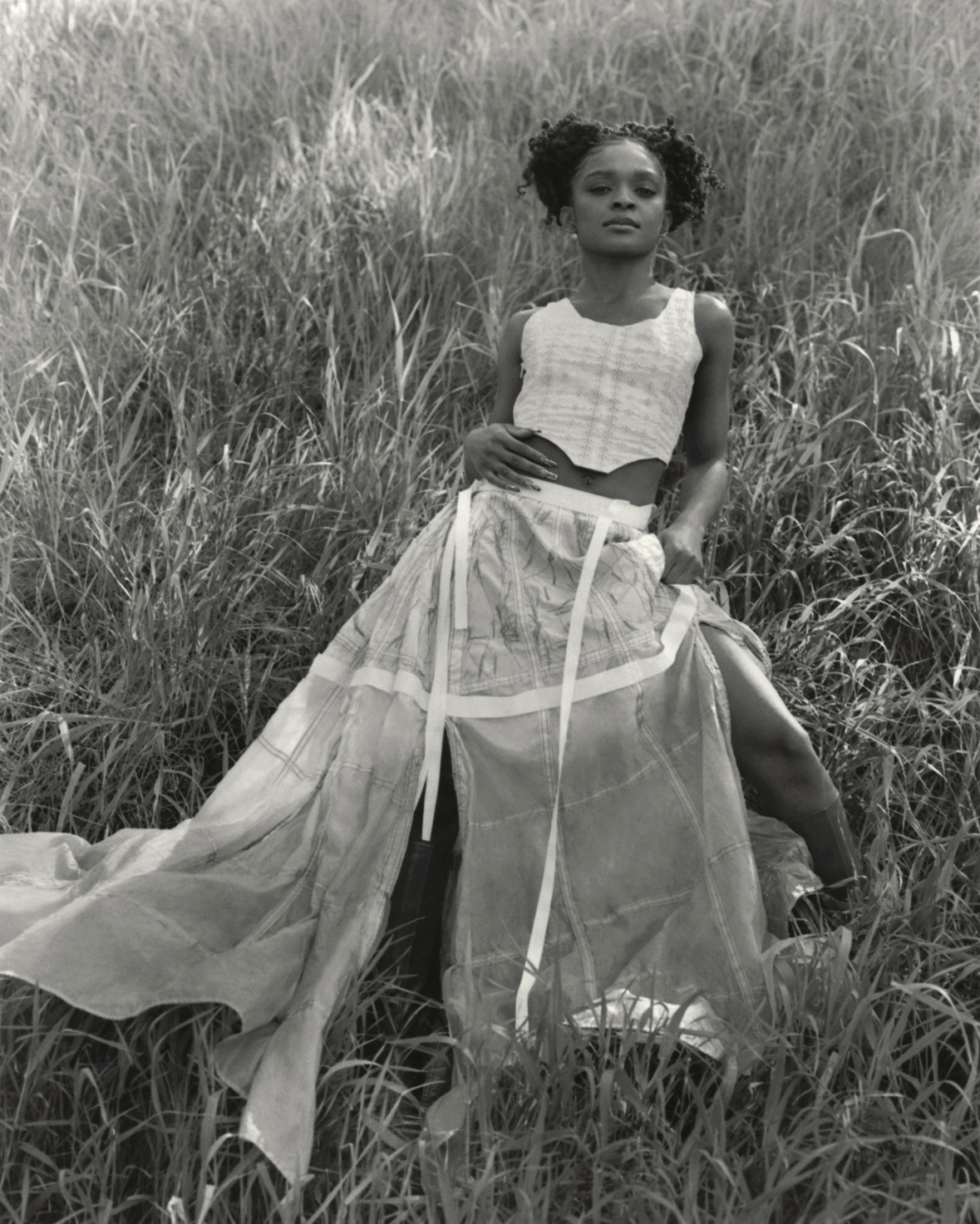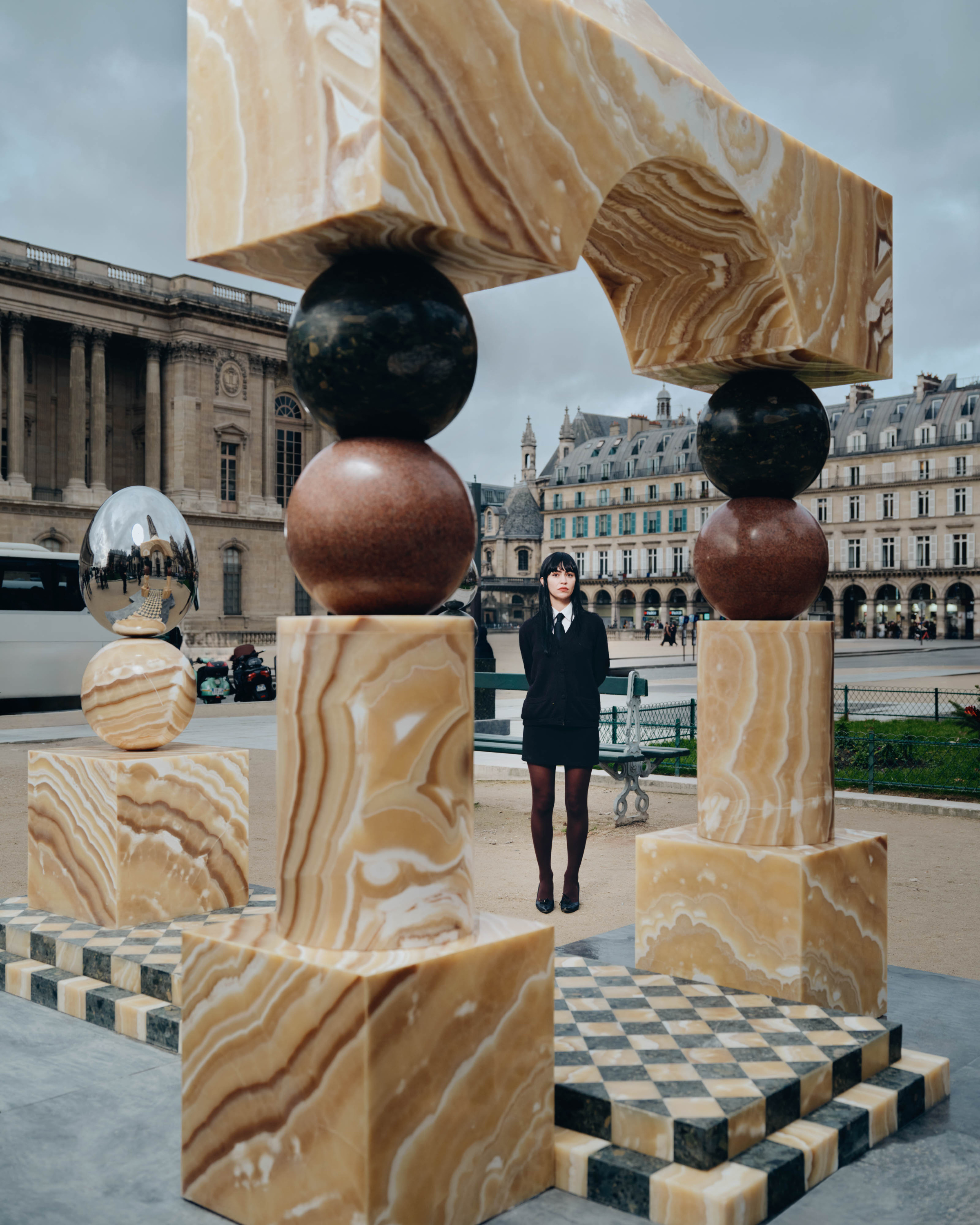The superhero would like a cup of tea, please. It’s an overcast, 60-degree day in Los Angeles. And in a city full of virtually uninsulated homes, 60 degrees outside means it’s 60 degrees inside this Mt. Washington photo studio. Dominique Thorne might play an ass-kicking heroine on-screen, but currently the actress is without her Ironheart armor. Actually—just a cup of hot water is fine. And a space heater. She’s sure to say “please” and “thank you” with every request.
If you don’t know Dominique, you probably will soon. Heard of the Marvel Cinematic Universe? Of course you have. Dominique made her MCU debut in Black Panther: Wakanda Forever as Riri Williams, aka Ironheart, and leads as the titular role in the forthcoming Disney+ series Ironheart. Riri is a bona fide supergenius MIT student who makes a super-suit rivaling Tony Stark’s iconic Iron Man armor.
The past year-and-a-half has been a whirlwind for Dominique. She spent much of 2022 inside the Marvel Cinematic Universe—Wakanda Forever wrapped in March, and by June she was bopping between Chicago and Atlanta to shoot Ironheart. When asked where home base is these days, she laughs and calls herself a nomad. Dominique is a longtime Marvel fan, so the rush of not only getting cast in the second Black Panther movie, but also starring in a six-episode Disney+ series has been, predictably, surreal. (But her fandom is nothing compared to her mom’s. “She’s Captain America’s number-one soldier,” Dominique says. And she’s serious. “Pick any line, any film. She knows it.”)
I met Dominique after Ironheart wrapped, but before its much-anticipated release. It’s also before Dominique quite knows how Riri fits into the larger MCU. She’s at a pause; perhaps the eye of the storm. Measured, thoughtful, and positive, she carries this sense like she’s on the precipice of something big. She’s taking a beat to breathe, to take it all in. But she can’t frickin’ wait for what’s to come. “Let’s get this baby going!”
- Top: Stylist’s own. Earrings: Vintage
- Top: Stylist’s own. Bra: Nensi Dojaka. Pants: Acne Studios. Boots: Jeffrey Campbell. Earrings: Vintage. Rings: Kayge
While Dominique doesn’t claim the supergenius title for herself, she does have an Ivy League degree. Her parents are both immigrants from Trinidad. (Maybe Dominique’s so cold because her body is still expecting island weather—she recently returned from Carnival in Trinidad, a spiritual experience, she says.) Education was the top priority in the Thorne residence in East Flatbush, Brooklyn. That was the agreement, anyway, between Dominique and her parents when she decided to go to the Professional Performing Arts High School in Manhattan. And she kept up her end of the bargain. While high school was the first time Dominique got serious about acting, she kept her grades up enough to get into Cornell. There she earned a degree in human development, a cross-disciplinary major that investigates why and how humans are the way they are.
Dominique didn’t have the most quintessential college experience. After signing with an agent upon high school graduation, the actress made up to four self-tapes each week between classes, occasionally bussing back to New York for callback auditions. After shipping out dozens of tapes, one eventually stuck. She landed a small role in If Beale Street Could Talk, an adaptation of the James Baldwin novel of the same title. She shot her part in Beale Street over two weeks—one falling over their fall break, so she didn’t even miss much class—then returned to campus life in Ithaca. Again: a normal college experience, and also…how many of us popped off to shoot a movie with an Oscar-winning director mid-semester?
But to Dominique, the Beale Street set was an education. “It was like getting a front row in one of the best classrooms I could hope to be in,” she says. Not only was she working under the direction of Barry Jenkins just after his film Moonlight won the Oscar for Best Picture, but she got to observe how the more seasoned actors among her carried themselves on set, especially Aunjanue Ellis and Colman Domingo. In them Dominique saw, “There’s so much love in this craft.” It set a high bar for future projects—not just in the caliber of the work but in the respect she hopes to bring to each project and her costars. Dominique remains in student mode to this day, watching and listening to her more seasoned actors on every set.
“There’s so much love in this craft.”
Like the actress herself, Dominique’s IMDb page is short but mighty. At the time of the interview there were just three projects listed on her acting resume: If Beale Street Could Talk, Judas and the Black Messiah, and Black Panther: Wakanda Forever. Adaptation of a novel by one of the greatest American writers? Check. The story of an undersung Black Civil Rights hero? Check. Boundary-breaking Marvel franchise? Check. Academy Award-nominated movies? Check, check, and check—gold statues for all three. It’s an impressive lineup for any actor, particularly one so early in her career. But Dominique sees a lot of this as—what, luck? Fate? She’s not quite sure. But certainly as opportunities granted to her rather than roles she’s seized or is owed. “I feel like I have to acknowledge that these three projects I’ve done are the only three ‘yeses’ I’ve been given,” she tells me. Remembering all those self-tapes, she jokes that only booking three projects isn’t a great batting average.
But she also sees a more meaningful throughline between Beale Street, Judas, and Wakanda Forever, and it’s not about the accolades. “All three of those directors”—that’s Barry Jenkins, Shaka King, and Ryan Coogler—“are people who are very intentional about the stories they tell, and the words and the people they use to tell them, and the time that they tell them,” she says. Dominique hopes she gets more “yeses” from folks with similar care and intentionality. But intention can be elusive for young actors when so much of the game is convincing others to offer you a job. In dedicating oneself to telling others’ stories you have to give up a bit of control to the universe.
- Top: Highrack. Skirt: Chereshnivska. Boots: Jeffrey Campbell. Earrings: Ming Yu Wang
- Top: Highrack. Skirt: Chereshnivska. Boots: Jeffrey Campbell. Earrings: Ming Yu Wang
Dominique didn’t grow up imagining being a movie star. It’s only been in recent months that she’s reflected on acting in her early childhood days. Family members will remind her of her penchant for storytelling from a young age—for instance, the Barbie camera she got one Christmas in elementary school. It was the kind with the tricolor cords you’d plug into the TV. She would hide the Barbie camera in various spots around the house. “I would catch people, I don’t know, eating?” she laughs.
Indeed, Dominique doesn’t remember acting much as a little kid. But she does remember the day she decided she might, actually, want to try a career in film.
She’d spent her entire time at her performing arts high school as a theater kid—a Shakespeare nerd. She applied to college theater programs with a Lady Percy monologue from Henry IV, pt. I. (She rattles the iambic pentameter off to me like it’s nothing: “O my good lord, why are you thus alone / For what offense have I this fortnight been / A banished woman from my Harry’s bed?”) And for her final graded performance of her senior year, she and her best friend had prepped a portion of Act IV, Scene III from Julius Caesar. Dominique was Brutus. The two had prepped and prepped, anxious to nail the performance that would determine whether they would graduate with a performing arts certification. The stakes were, well, Shakespearean.
“Trying to understand how to put yourself in someone else’s shoes, to speak from their perspective with authenticity … can have the ability to convict people in real ways.”
Enter: Regular old, high school nonsense. Remember how toward the end of the year, or during finals period, burnt-out teachers would play movies for you in class? In one of the periods before her big scene, a teacher of Dominique’s threw a film on screen for her students: Fruitvale Station. That’s right: Black Panther writer/director Ryan Coogler’s first feature film. It was this movie that made Dominique realize what acting and storytelling could really do.
“I felt like that was the first time I understood that this thing I had been occupying my time with—trying to understand how to put yourself in someone else’s shoes, to speak from their perspective with authenticity, that it can have the ability to convict people in real ways.” This was the moment acting became more than something she liked to do to and something she needed to do. Amped up from Fruitvale Station, Dominique crushed her Brutus performance.
She recalls years later, while on the set of Judas, having a conversation with actor Daniel Kaluuya about the craziness that is making a feature film. Paraphrasing Daniel, she says, “People don’t understand the marathon of a production until they’re in the thick of it.” Right now Dominique is in the thick of it. Not of a movie—she’s finally on a break and loving it. She’s trying to take a moment within the marathon of making Wakanda and Ironheart to look around, breathe, and make sense of what’s happening.
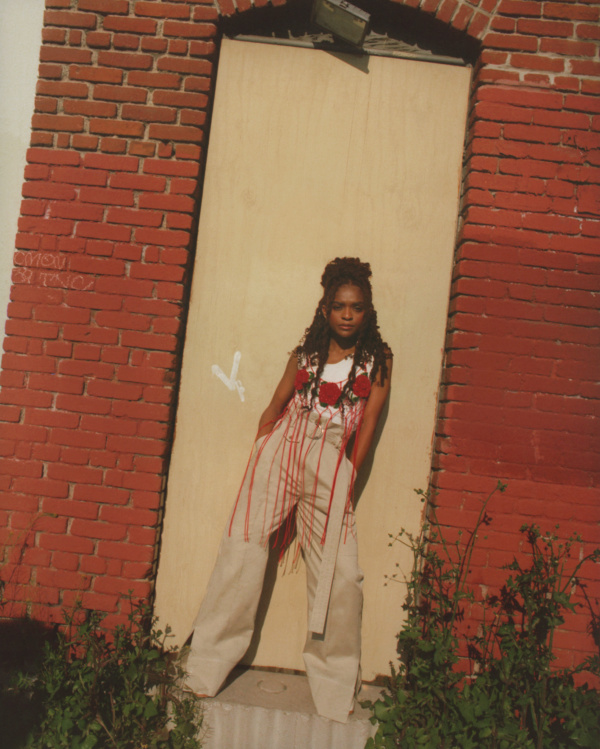
Top, pants: Geel. Floral piece: Sara Wong. Boots: Intentionally Blank. Earrings: Ming Yu Wang. Rings: Kayge
Despite her impressive early-career accomplishments, Dominique is only just beginning to really understand the nature and magnitude of the kinds of stories she wants to tell. She carries an air of maturity and grace, even at 23. She also spends a lot of time reflecting on her identity as a first-generation American, a Trinidadian-American, and a Black American, and the way those influence her as an artist. Her identity as a first-generation Trinidadian-American “is the theme that’s guided me through every phase of my life,” she says. “What I’m moving through now is how my expression of it looks in this moment.”
For Dominique, acting has always been an expression of that identity. “It was a gift before it was a career or a craft I understood,” she says. “It gave me language for all the beautiful things I was seeing through that Barbie camera and beyond.” But Dominique doesn’t pretend to have all the answers. Not yet. She’s not Riri Williams, after all.
The day we meet she’s anticipating the ESSENCE Black Women in Hollywood Awards the following day. She’s being honored alongside—she gives one of her measured explosions, a soft-spoken, “Oh my god,” before naming the other nominees—Danielle Deadwyler (Till), Sheryl Lee Ralph (Abbott Elementary), among others. She’s riding the wave, yet awestruck when she takes a step back to realize she’s there. And with Ironheart dropping later this year, the wave is only going to get bigger, steeper, and gnarlier.
We wrap the interview and I stop recording. Then, Dominique’s compulsive curiosity—or perhaps just her politeness—gets the best of her. “Finally,” she says to me, “I can ask about you. Where are you from?”
Fashion by Ariana Velazquez
Hair by Dani Oglesby
Makeup by Lina Mourey
A version of this article originally appeared in Sixtysix Issue 10 with the headline “Super Suit Ready.” Subscribe today.

